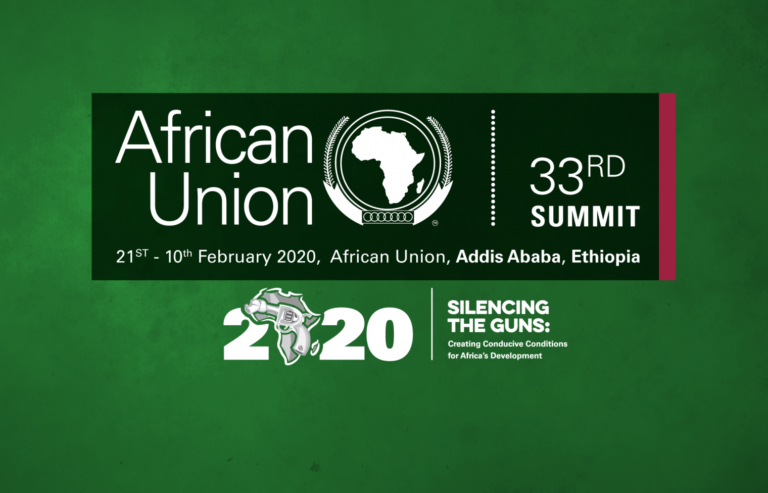African leaders just concluded the 33rd African Union (AU) summit at their headquarters in Addis Ababa, Ethiopia. The 2020 theme has been choreographed as ‘silencing guns in Africa,’ a move that seeks to put an end to war and violence within the continent.
Reason for the theme.
The theme has been under preparation for several years now and several retreats have been convened to create a roadmap to this noble initiative. The theme was adopted on 25 May 2013 by the AU Assembly of Heads of State and Government during the 50th Anniversary of the Solemn Declaration. The then chairperson of the AU Commission, H.E. Dr. Nkosazana Dlamini-Zuma called upon experts to discuss prudent ideas towards silencing guns in Africa. Several high-level retreats have taken place since then.
Africa’s post-colonial wars
A number of African countries have been in decades ravaged by un-ending wars leading to instability in their respective regions. Currently, there are over fifteen African countries involved in a war or are experiencing post-war conflict and tension. In West Africa, the countries include Guinea, Liberia, Ivory Coast, Sierra Leone, Nigeria, and Togo. In East Africa, the countries include Eritrea, Ethiopia, Somalia, Sudan, Uganda. In Central Africa, the countries include Burundi, The Democratic Republic of the Congo, Rwanda. In North Africa, the country is Algeria and in Southern Africa, the countries include Angola and Zimbabwe. DR Congo and Somalia are among the top countries that have been experiencing instability for more than a decade.
The root of the wars
Most of these wars can be blamed on poor leadership and external influence. A report by the International Journal of Security and Development linked poor leadership to the root cause of violent conflicts in West Africa. They reported that ‘the roots of conflict in West Africa are much deeper and complex, and are embedded in the interplay of historical factors, socio-economic crisis, legacies of authoritarianism and the politics of exclusion, international forces, and local struggles.’
Other factors that have widely been reported include ethnic marginalization, poverty, human rights violations, and bad governance and corruption.
AU’s efforts to stop the previous conflicts
Conflict is inevitable in any society and requires taking risks to put an end to it. The African Union has in many instances tried to bring conflict resolution in all the countries that have been involved in an absolute war. The tasks of managing or resolving conflicts in Africa have been profoundly difficult for the AU. The AU peace mission brought stability in Burundi when a task force was deployed to protect, disarm, demobilize and reintegrate combatants. The ceasefire negotiations in Burundi has been described as the AU’s biggest success story.
DR Congo’s long fight has seen the central African state experience high levels of insecurity and a threat to neighboring countries like Rwanda, Uganda, Burundi, Tanzania, and the Central African Republic. The neighboring countries had before 1998 invaded DRC to fight off the militants but this move was constantly criticized by DR Congo’s government. Lusaka ceasefire agreement was later signed by the affected countries under the AU observation mission on July 10, 1999, and brought an end to the second Congo war.
The AU also brought an end to the Darfur war in Sudan where the Arab ‘white’ Sudanese government fought a civil war against the predominantly black population. The Abuja Inter-Sudanese Peace Talks later led to the signing of N’djamena Humanitarian Ceasefire Agreement on 8 April 2004. This brought peace between the government of Sudan and the Sudanese People’s Liberation Army.
Advice to the AU
The African Union has to understand the fundamental issue at hand resulting to violent conflict in a given country. In his book, Understanding Conflict Resolution, Peter Wallensteen reveals that understanding the historical root cause of the conflict will help in settling down any issue at hand. The AU must understand the dynamics and how guns and other weapons get to our hands. Guns just don’t appear on our hands. There is a manufacturer, buyer, transporter, user and the victim. They have to identify who benefits from these conflicts. Multinational companies have been blamed by several human rights groups for fueling conflict in Congo that is known for its vast mineral deposits. The AU should also set up a unit that can investigate various leaders on their conduct and appropriate measures taken in case they are suspected of any mischievous deals leading to violent conflicts.
















